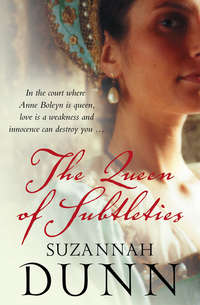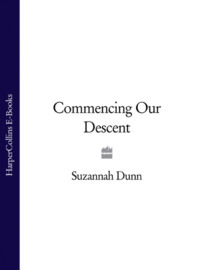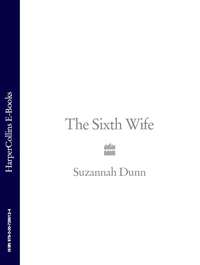
Полная версия
The Confession of Katherine Howard
In the middle of the room, Jane Rochford was playing the lute in a business-like way. I kept waiting for Kate to say, That’s enough for now, thanks, Roch, but she didn’t; she didn’t seem to hear it, whereas, unfortunately, it was all I could hear. There was never any respite from Jane Rochford: that dissatisfied but self-satisfied face was ever present in the queen’s rooms. She never went off as everyone else sometimes did, for dog-walks or flower-picking or bowls-games, and - understandably - no one ever asked her along to any music practice. She was forever hanging around, imposing herself on whomever she could find and sighing hugely as she did so, under the mistaken impression that her affected languor was comical. She was never off duty because unlike all the other ladies she had no home to go to; no one had re-married her in the four years since her husband’s execution.
Kate was mooching at the windows, sunlight snagging on her new brooch — a lover’s knot of diamonds which the king had given her - but suddenly, ‘Oh!’ and she whirled around, finding me first. ‘Look!’
I laid aside the letter I was writing to my cousin, and rose, craning to see the king’s party beyond the moat.
‘Looks as if he’s off hawking, but why didn’t he say?’ She had no love of the outdoors, and probably would’ve declined an invitation to join him, but she resented not having been asked. Also, Thomas Culpeper would be gone all day because not only was he one of the king’s favoured gentlemen, but he was a skilled hawker and even though we couldn’t spot him at such a distance, we knew he’d be there.
‘Where’s Francis?’ I asked her.
‘Well, not there,’ she replied, cocking her head towards the hawkers, amused by the prospect, the absurdity of it. Francis was firmly in her retinue, as I was; we were unknown to the king’s household. Francis’s place, like mine, was here, in her household. We’d come with her from home: we were hers.
I persisted: ‘So, where is he, then?’
She didn’t know. ‘Perhaps he’s ill.’
‘He was fine, this morning.’
She gave me a look - I bet he was - but her flippancy rankled. ‘I’m serious.’
She shrugged, expansively, turning it into a hugging of herself, turning herself away from the window.
Later, increasingly intrigued by Francis’s whereabouts, I slipped into the second sitting of dinner in the Great Hall in search of his room-mate, Rob, who was able to tell me that Francis hadn’t ever returned, that morning, to his room. Not ill, then, but up to something. There’d been mention, I recalled, of some clothes that he was considering buying from someone: perhaps that was what he was doing, busy trying to raise or retrieve the cash. Back in Kate’s rooms, I spent a while longer expecting him to arrive before giving up and going for my walk. Maggie asked if she could come, and as always I was glad of a chance to lose myself in her cheery company. She tripped along at my side, chattering endearingly about some of the New Year gifts that she’d soon be sewing, and impressing upon me the various achievements of her little godson, before embarking upon a lengthy account - to which, admittedly, I only half-listened - of her family’s dispute with the mason who was supposed to be building her grandfather’s tomb. Maggie: two years my junior but in many ways old for her years. There was a gem-like shine to the river and cloud cover was no heavier than breath condensing on the surface of the sky.
I was surprised not to see Francis on my return. Still no one remarked on his absence, but, then, despite his position as usher to Kate’s rooms, he did tend to come and go. Loyal to Kate though he was, he often disappeared - horse-riding, tennis-playing, tavern-frequenting with friends or his brothers - and managed to square it with her afterwards. I wasn’t overly concerned. If anything was amiss, he would - I was sure - have told me.
Prayers, supper, and some music-making: the afternoon and evening drifted on. At six o’clock, as usual, Sir Thomas Heneage came along with news of the king for Kate. He was a funny little man, goofy and chinless; Kate didn’t often take to funny little men but Sir Thomas was an exception and she always invited him to stay for a drink and a gossip. This evening he told her that the king had gone off to London. London, suddenly, by barge, late on a November afternoon: something had come up, we might’ve surmised. Someone, perhaps: a troublesome nobleman or cleric; someone fallen from favour and being taken to task. But that was if we thought about it at all, and it’s just as likely that we didn’t.
Eventually, the evening livened up. Only a few of the king’s gentlemen had accompanied him to London and just before eight o’clock the others turned up at Kate’s door, ring-led by her brothers who were as delighted as ever with themselves. Their merry band was vying for an invitation, which, as usual, was forthcoming, albeit being issued under the ever-watchful eye of Lady Margaret. The men were eager to be entertained, although the day’s hawking had helped deplete some of the ebullience that was often a problem after the end of the hunting season. In the end, good-natured gambling sufficed, the knight-marshal kept busy with the tallies.
November 4th
The following morning, Francis was back in attendance, carrying on as if he’d never been away. I felt I was owed an explanation. Kate was keeping him busy, presumably with the usual mix of tasks. He was both her usher - gatekeeper to her rooms — and her secretary. The pair of them never worked together in a closet - that would’ve been too serious for her - but would merely retreat to a corner of whichever room we were all in. There, he’d read aloud the clutch of letters that arrived daily for her, and they’d discuss how he should respond on her behalf. They’d go through any appointments that needed to be made, and he’d set about making them. Then there were the thank-you letters for gifts - from silverware and sumptuous fabrics to baskets of fruit and jars of preserve - which came from people in every walk of life who, for their various reasons, were anxious to curry favour. Then perhaps they’d work on formal renditions of any pleas for clemency which the king had already heard from her in private and indicated that he’d permit. I’d never anticipated what a soft touch she would become in that respect, although, upon reflection, there was nothing soft about it. She was genuinely unnerved to think of the hard and fast nature of the law: its drastically impersonal, inflexible nature. What drew her to particular cases - what she had a feeling for - was the minutiae of personal circumstances, and I could well imagine that she made them compelling when relaying them to her husband.
All that morning, she and Francis made quite a spectacle with their industry. She was elaborately pinned and tucked, every inch the girl-queen, as good as gold, and he had an officious air. Habitually, he listened to her with only half his attention, polite but vague, but that particular morning he was frowning with concentration. He’d often make much, to me, of how he’d have been nothing without her, of how he owed his success to her - here he was, private secretary to the queen of England - but I wasn’t so sure. When we girls had first come across him, he was a gentleman pensioner of the Duke of Norfolk’s, an enviable position, and had he stayed in the duke’s household, he’d have done very well for himself. He was following Kate’s lead in that her own rise had been something of a fairytale, but she too, I sensed, had chosen to believe in the inevitability of it. For her, the obscurity of her earlier life had been the mistake and the recent elevation her due. A natural enough attitude to take, I supposed, but I’d expected something different from her — from her of all people, so impatient with others’ pretensions.
At last, late on during the afternoon - too late, in my opinion — Francis came to find me in the gallery, where I’d got drawn into music practice with Alice and Anne Basset. He came slinking over, all smiles, attempting to slide his way back into my favour. ‘Hello, you.’
I said nothing although I did tilt my face for his kiss, which then struck me as a gesture typical of Kate - that showy petulance that she affected with men.
‘Been busy?’ He was keen to make amends.
Was I ever? But he’d asked, he’d given me the opportunity to knock him back, so I launched laboriously into a list of the day’s decidedly unspectacular activities: I’d written to my cousin and my father; tackled a new piece on the virginals; been entrusted to choose a gown and some jewellery for Kate from The Wardrobe and The Jewel House, settling on an indigo satin gown and sapphire-and-pearl necklace; managed to catch Liz Fitzgerald’s favoured tailor when he was visiting her, to ask if he could make a cloak for my little cousin in time for New Year; and dropped in at the Duchess of Richmond’s rooms to check the progress of the puppies, one of which, when weaned, would be Kate’s. I related all this in a deliberately flat tone, staring him down as I did so. Understandably, when he’d listened politely, he backed off.
Later still, when the evening’s dancing began, I relented and took him aside, finally asking him outright, ‘So, where were you, yesterday?’
He turned his big eyes to mine. ‘My mother wasn’t well.’
‘What’s wrong?’ It must’ve been something serious, I thought, for him to have gone all the way to London, and my stomach clenched at the prospect of what he might be facing. Then again, he’d come all the way back, so whatever was wrong hadn’t been serious enough to detain him.
‘I don’t really know.’
That struck me as vague, but, then, Francis was so often vague.
‘Well, is she any better?’
‘A bit.’
I began to suspect he was lying, so I delved: ‘Were your brothers there?’
He nodded.
‘Both of them?’
‘Yes.’ A touch of impatience, now: I said so, didn’t I?
And thus I had him: ‘You told me your younger brother was in York.’ He’d told me that his brother had gone up there the previous week for a month of work.
He narrowed his eyes, he was cross. ‘Well, he came back,’ and he protested, ‘I don’t tell you everything.’
I sighed. ‘Clearly not, Francis.’ York and back inside a week? There’d barely have been time to turn around. He was definitely lying.
‘Look…’ but then he dropped whatever further protest he was about to make and settled instead for, ‘I’ve had a really, really long day,’ and I saw how that, at least, was the truth. He looked exhausted. Tenderness washed over me and I let it drop.
November 5th
I shouldn’t have, though, because in the early hours of the following morning a couple of handfuls of soil hissed at my window. Alice didn’t stir but both Thomasine and I were woken. Thomasine occupied the side of the bed nearest the window and with a lot of muttering - Bound to be Mr Dereham, what’s the betting it’s Mr Dereham - she raised herself to it, prised it open, and peeked - ‘Yup’ - before flopping back down and yanking the bedclothes over her head. Anxious to put a stop to the disturbance, I rose and - nightgown over nightshirt, and shoes on - hurried down there.
He’d ducked inside the stairwell to hide from the night-watch. Despite the darkness, somehow I could see he was huge-eyed. His breathing skittered over the silence. He said nothing. He was terrified, I realised, and terror of my own leapt up inside me to meet his because I’d never seen him like this. He was here on the run from something or someone. This - here, this dark stairwell - was his refuge, yet clearly it was no refuge at all.
I couldn’t - just couldn’t - take him in my arms; something held me back, a dread perhaps of making him vulnerable. And he, too, held himself separate, trying to hold himself together. And so we stood there, looking at each other in the darkness. Still he said nothing - he couldn’t say it, I understood, he couldn’t bring himself to say that earlier he’d lied to me. It was obvious now but it had been obvious at the time, too, and I had to quell my fury that we’d ever had to go through that charade of his mother’s supposed illness.
He confided, ‘It was Wriothesley,’ his breaths uneven and raucous in the silence.
Thomas Wriothesley, secretary of state to the king. I didn’t understand: ‘What was Wriothesley?’
‘Had me in for questioning.’
Still nothing: it made no sense whatsoever, to me. ‘About what?’ Why on earth would Thomas Wriothesley be questioning Francis? And all day? And in such a way as to cause this terror in him? Francis was no one, he’d know nothing about anything. He was harmless: he was an innocent if I’d ever known one.
He urged, ‘About before’, as if that should mean something.
‘Before?’
‘When we lived at the duchess’s.’
What was there to know? What could possibly be of interest to a man such as Wriothesley? Or indeed anyone. I could barely recall our time there, myself, not least because there was nothing to remember: that was its distinguishing feature, for me. Nothing had ever happened at the duchess’s. ‘What about the duchess’s?’
Despite the darkness, I knew he’d given me a very direct look: loaded, in warning. ‘Kate,’ he whispered.
‘Kate?’ Kate had been nobody when she’d lived at the duchess’s: she was just a girl. That was her virtue. All those previous complicated queens with their connections, but Kate was no one - a Howard, yes, but a minor one - and she had no history.
‘Kate and me,’ he said, and then suddenly I knew what he meant and my heart shrank. I tried to keep myself steady. He was looking at me - of course he was - and I resented it, I wanted not to be there under his scrutiny; I wanted to be away, by myself, alone.
‘And’ - he sounded wondrous - ‘he knew it all.’
All: well, I didn’t want to think about that. A tiny word encompassing so much, none of which I wanted to remember. I’d assumed we’d left it long behind.
‘I don’t know how’, he continued. ‘But it was just, “We have information.’”
‘You didn’t do anything wrong,’ I said, because that was the point, pure and simple, and we needed to keep to the point. ‘She wasn’t married to the king, then.’ Why, though, then, had Wriothesley questioned him about it? ‘You did nothing wrong, there’s no law against it.’
I was right, I knew I was right, so Francis’s scepticism - a puff of dismissal - riled me. There was some reluctance from him — a held breath — before he ventured, ‘But if there was pre-contract -’
‘But there wasn’t.’ My insides were tight. ‘Was that what Wriothesley was asking about?’
‘Yes.’
‘Well, there wasn’t.’
We stood staring at each other in the darkness. I was listening hard to his silence; I could hear he was thinking of saying something. Then it came, tentatively: ‘Some people would say there was.’
I held my temper, and was straight back at him: ‘Some people will say anything, but Wriothesley’s not asking them, is he. He’s asking you. What did you tell him?’
‘I said no, of course.’ Now making something of being offended that I should even ask.
If he and Kate had been pre-contracted - if they’d promised themselves to each other - then they’d have been as good as married, they’d have been married in all but name and the king’s marriage to her, coming afterwards, would be no marriage at all. Francis would be married to the queen, and - worse - he’d have known it. Kate would be a bigamist, and Francis would at the very least be an accessory to the hoodwinking of the king. So, the answer had to be no.
He and Kate had been a couple, at the duchess’s, and almost everyone in the household had, in the end, known it. Here, now, Maggie and Alice - our old housemates - knew. Francis and Kate had been lovers. He used to call her ‘wifey’, ‘wifelet’: it was a joke, but also it wasn’t. A joke and no joke. I said, ‘You should’ve been more discreet,’ regretting it even as I said it because it was ridiculously unhelpful and even in the shadows I detected him giving me a despairing look. Quickly, I changed the subject: ‘Kate doesn’t know, does she, that Wriothesley had you in?’ I didn’t think so because - I was pretty sure - if she knew, I’d know.
‘No.’
‘Good. Look, this is nothing, Francis, is it. They just have to check. If someone’s said something, they have to check, that’s all.’ And they’d have had to go to him because no one would dare approach the queen with it.
‘Who, though?’ he urged. ‘Who’s the someone? And why, and why now?’
That, I didn’t know and didn’t want to contemplate and it didn’t matter. What mattered was that there was no pre-contract and that Wriothesley was able to establish the fact. What a blessing, in a sense, that he was investigating the past, his attention turned hard from what was currently happening with Thomas Culpeper. This was the luckiest escape ever, for Kate. She should stop what she was doing with Thomas Culpeper, though; she really had to stop it and I was going to have to say so.
He read my mind. ‘Don’t tell her,’ he insisted. ‘Don’t say anything. Wriothesley said I’m to tell no one at all, no one, understand? Or this’ll get nasty: that’s what he said.’
‘Nasty?’ I was taken aback. Nasty? How dare he! Suddenly I felt sick to think of how the questioning might’ve been for Francis: the tone and the content of it. Yet in a sense the threat was a good sign, surely: under no circumstances was the queen to hear of any of this; it could be resolved without her ever having to hear of it. I returned to what mattered: ‘Did he - Wriothesley - believe you? About the pre-contract?’ - the lack of one.
‘I don’t know.’
Not the answer that I’d wanted, but at least he was being honest with me. ‘Francis, listen: he has to believe you. You have to tell him. You have to tell him it was nothing, that you were just two silly kids…’
He said, ‘Yes,’ but I heard the anger in it. He didn’t like me being dismissive of whatever it was that he’d had with Kate in the past. Look at us, I despaired: it wasn’t each other with whom we should be angry. Then the realisation, ringing with the clarity of a bell: I must protect him. He was incapable of doing it himself: he didn’t think ahead. But I did, it was as natural as breathing to me and now I could do it for him. I’d do anything to protect him. I took his arms, ran my hands up and down his arms: not much of a touch, but something, and enough, because he gave in, stepped forward and folded himself down over me. ‘Go back to bed,’ I whispered against his chest. ‘Get some sleep.’ And saying so, I could make an end to it, at least for now. ‘Whatever this is about,’ I said with utter certainty, ‘it’ll blow over.’
And I believed it, absolutely I did. I was right to think that Francis had done nothing illegal, and I was naïve enough, back then, to believe that what mattered was the truth. Worried, though: yes, I was, and of course I was. Wriothesley was secretary to the king: he was the man who, effectively, ran everything. Not, presumably, someone with time to waste on anything unimportant. But I’d heard nothing to suggest he was an unreasonable man, as some of the king’s men were known to be. He was one of the new men: a capable administrator. Presumably, his hands were as good as any for Francis to be in, although I didn’t like what those hands had already done to him, he who was usually so sweetly devil-may-care. But, I reminded myself, Wriothesley would’ve had to be thorough. Someone had let something slip and it’d come to the attention of the king’s own secretary who was duty-bound to investigate and then, finding it unsubstantiated, get rid of it. Which he would, because Francis had done nothing. Yes, he and Kate had messed about, but who hadn’t? Well, to some extent, anyway. What mattered was the future: that’s what I kept reminding myself, all through that night. The king adored Kate. Even if he did ever hear of what she’d got up to in her earlier years, he’d turn a blind eye because he was looking to the future, to - at long last - a successful marriage and, God willing, a second male heir. He was getting on in years; he hadn’t the time for quibbling over details of the past. He’d finally found what - or who - he’d been looking for. He’d never been happier - everyone said so - and Kate was doing such a good job. She was ideal: uncontroversial, with no strong religious affiliation - simply a traditional girl - and the Howards were stalwarts, not newcomers. And in any case her ties to her family were comfortably loose. And she was English, too, not foreign like the first queen and the latter. She was everything he needed. True, she wasn’t yet pregnant, but these were still fairly early days and she was young and healthy. She was entirely trouble-free except for what went on, sometimes, in her bed behind her closed door on nights when the king hadn’t asked for her. But no one knew about that, except me and Francis and Jane Rochford, and anyway it’d stop, soon enough, despite what Kate claimed; I knew it would; it always did, although probably she’d then take up with someone else. I wished she’d stop it, now that she was queen. Why couldn’t she stop it?
I did manage some sleep, in the small hours - I must’ve, because before I knew it, I was up against the morning and there was nothing for it but to drag myself out of bed. I was slower than the brisk, ever-organised Alice: she was gone even before I’d placed both feet on the floor. Dressing under Thomasine’s brisk supervision, I was dogged by unease, slipping free of it only whenever she snared my attention. Francis had been terrified: the fact was inescapable. I didn’t want to think about how he’d looked; I’d never seen him like that before. Every time I closed my eyes, there he was, but he wasn’t the Francis I knew.
Outside, a fine rain pulsed in gusts. Again I arrived at Kate’s rooms later than usual; later than everyone, I established instantly, except Francis. No Francis. I steadied myself in the doorway, told myself that perhaps he was sleeping late, as I’d done. Perhaps, like me, this morning, he was befuddled and slow to emerge. Perhaps, though, he’d gone on the run. Would he? If he ran, they’d chase him. I willed him: Be sensible. But that was a lot to ask of Francis.
I was barely across the threshold before Kate was heading for me, which had my heart catch before I registered her expression. Amused, she looked, and my blood surged because perhaps she was going to laugh and say, You’ll never guess what… and, I told them…, and everything would be fine and she’d given Francis the day off to recover. I hardly dared hope it. She gestured that I should join her in the gallery: we were to talk privately. I followed her train of rosy velvet stitched with gold-thread swirls and studded with pearls, and the others in the room barely glanced our way; they’d think nothing of Kate going off to gossip with her oldest friend.
In the gallery, she led me into a window recess hung with a cage of songbirds.
‘Francis is in for questioning about tax,’ she said, cheerfully. ‘Did you know?’
My heart contracted. Something else, something more? Was someone, for some reason, out to get him?
‘They sent a man to tell me,’ and it was this, apparently, that had amused her, the formality of it. She quoted the officious man: ‘“He will be unavailable for duties, today.’” I understood it differently, though, this despatching of a messenger. This was nothing to do with tax. Wriothesley had Francis for a second day and had gone to the trouble, this time, of putting Kate off the scent. A second day of it? How many ways were there to ask the same question?
‘What’s he been up to, then?’ she was asking, affectionate. As if she cared. ‘I hope they don’t drag me into it, because he did give me that money, once, to look after.’
What money?
‘When he went off to Ireland, that time.’ She smirked. ‘I’m queen, see: good strongboxes.’
Yes: as queen, she’d have been the safest option. I’d said it before I could stop myself: ‘You should be careful, Kate.’







